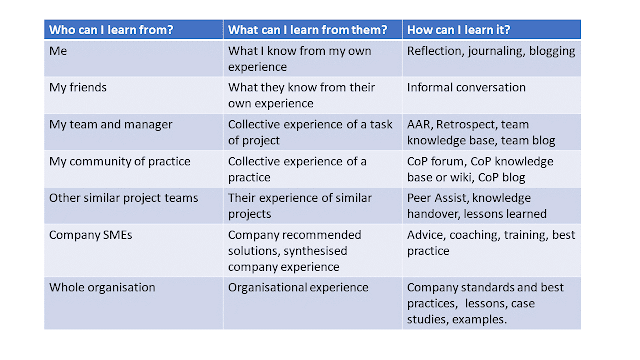
Favorite There is a clear view than knowledge lies in the “walls” and the “hallways” between the “rooms” of an organisation. Here are some of the implications of this view for Knowledge Management. Image from wikimedia commons This blog post was inspired by a post from Nancy Dixon entitled Where Is
Read More
 Shared by Nick Milton April 4, 2022
Shared by Nick Milton April 4, 2022

Favorite Internal company search seldom works as well as Google, because so few people optimise the findability of their content. Image from Wikimedia commons People often cite Google as the gold-standard in search, but partly Google works so well because of the prevalence of search-engine optimisation in the World Wide
Read More
 Shared by Nick Milton December 8, 2020
Shared by Nick Milton December 8, 2020

Favorite In 2008 David Snowden published a landmark article on 7 KM principle, mainly focusing on the supply side of knowledge management. The post below, upcycled from 2012, aims to present similar principles from the demand side. Principles by Nick Youngson CC BY-SA 3.0 Alpha Stock Images David’s 2008 post is currently (Nov
Read More
 Shared by Nick Milton November 9, 2020
Shared by Nick Milton November 9, 2020

Favorite A personal learning matrix reminds people of the sources of knowledge available to them. The matrix shown above is inspired by a really interesting blog post entitled “how rocket scientists learn” by Yasmin Fodil from NASA. Yasmin points out that Knowledge management is about the better application of collective
Read More
 Shared by Nick Milton October 7, 2020
Shared by Nick Milton October 7, 2020

Favorite How do graduates search for knowledge, and what this means for KM. Image by mohamed Hassan from Pixabay Here (summarised here and slides here) is a really interesting study about the difference between the strategies that new-hires use when seeking for information and knowledge, and the strategies their employers expect
Read More
 Shared by Nick Milton October 2, 2020
Shared by Nick Milton October 2, 2020

Favorite We all suffer from bandwidth issues in KM – generally due to the deluge of information. Here’s a good principle from the military for dealing with these issues. Information overload by SparkCBC on Flickr The phrase – “Smart push, warrior pull” (described here). is a very useful military principle for
Read More
 Shared by Nick Milton September 16, 2020
Shared by Nick Milton September 16, 2020

Favorite Here is another excellent article from Tom Davenport, one of the clearest writers on the topic of Knowledge Management, making the case for a structured “just-in-time” approach to the supply of knowledge. Tom starts his article as follows: In the half-century since Peter Drucker coined the term “knowledge workers,”
Read More
 Shared by Nick Milton July 23, 2020
Shared by Nick Milton July 23, 2020

Favorite People often ask us “how do we incentivise knowledge sharing?” I often answer “don’t bother. Incentivise knowledge seeking and re-use instead”. I give this answer, because knowledge sharing in itself achieves nothing. Knowledge needs to be sought and re-used before any value has been added, and re-use is often
Read More
 Shared by Nick Milton January 17, 2020
Shared by Nick Milton January 17, 2020

Favorite According to one expert, people are either Rocks or Sponges when it comes to learning. The most powerful thing that leaders can do to help Knowledge Management succeed is to drive that desire to learn as part of the corporate culture. If the drive to learn is there, the
Read More
 Shared by Nick Milton July 16, 2019
Shared by Nick Milton July 16, 2019

Favorite When we set up our KM systems, lets make it as simple as possible for the knowledge-seeker. Let’s aim for the one-stop shop. Image from geograph.org.uk It is common for Knowledge Managers to start to plan their KM systems based on the supply of knowledge, or based on the
Read More
 Shared by Nick Milton June 20, 2018
Shared by Nick Milton June 20, 2018
![]() Shared by Nick Milton April 4, 2022
Shared by Nick Milton April 4, 2022









